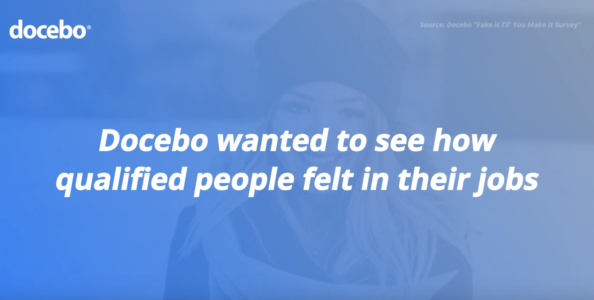'Fake It Til’ You Make It', A Survey Report For Understanding Employee Job Confidence
- A third of the U.S. workforce doesn’t feel qualified for their job
- Over half of U.S. employees have a colleague they feel isn’t qualified for their job
- One in three employees turn to Google or YouTube for help, rather than ask a coworker
TORONTO - Jan. 17, 2019 - When it comes to job training, employees are feeling underqualified and unsupported. That’s according to the ‘Fake It Til’ You Make It’ survey report released today by Docebo, the global leading artificial intelligence learning platform. The company surveyed a total of 2,400 employed adults in the U.S. and UK to understand how confident and qualified they feel in their current roles and how on-the-job training impacts the decisions they make at work.
Overall, employees across both countries don’t feel qualified for their jobs. One in three (32 percent) in the U.S and UK admit they’ve felt unqualified for their job, and another 33 percent fear that a boss or colleague thinks the same. Workers also have little faith in their colleagues’ performance with over half (52 percent) in both countries saying they have a colleague who isn’t qualified for their job. These fears impact workers’ wellbeing, with one in four (23 percent) fearing they may be let go from their job at least once a month because of a lack of skills.
This feeling of under-qualification is caused by poor on-the-job training. One in three (35 percent) consumers say their employer’s training is out-of-date with Brits (38 percent) even more likely than Americans (33 percent) to say that training doesn’t meet their expectations. Poor training is also pushing more employees to go to Google for help with 37 percent preferring to search on Google or YouTube for a solution, rather than ask a coworker.
Additional report findings show:
- Training impacts workplace happiness and retention.
The majority (59 percent) of the U.S. and UK workforces say learning opportunities impact their workplace happiness. This is especially the case in the U.S. where 32 percent find learning opportunities critical to workplace happiness, compared to 27 percent of Brits. Opportunities to learn and grow are so critical that 36 percent respondents in both countries - and half (48 percent) of all Millennials - say they would quit a job due to a lack of learning opportunities. - Americans are less likely to bluff a resume to get the job.
On average, today’s workforce is open to asking for help. In fact, 65 percent have admitted to their boss that they didn’t understand an assignment or concept. However, employees admit that they still lie at times, especially when it comes to padding their resume to land a job. One in five (20 percent) admit they have lied about their experience to get a job, a trend that happens more in the UK (22 percent) than in the U.S. (18 percent). British Millennials are also more likely to lie (24 percent), than American Millennials (20 percent). - Video training is the preferred method in the U.S.
When asked how they prefer to learn, only 13 percent opt to read training documents, while 17 percent look for training videos. Video is most widely preferred in the U.S. where one in five (20 percent) express interest in training videos, compared to one in seven (15 percent) in the UK.
“Training tools simply aren’t keeping up with the needs of today’s digital workforce and it’s impacting how they are able to build their careers,” said Claudio Erba, CEO of Docebo. “To ensure employees thrive in the workplace, companies need to implement training tools that match the ease, personalization, and interactivity of platforms like Google and YouTube. This not only helps the workforce to feel more empowered but will also create new opportunities for a business to evolve the types of roles and tasks its employees take on.”
Survey Methodology
The ‘Fake It Til’ You Make It’ report was based on a survey of 2,400 respondents aged 18+ (1,200 each in both the UK and the U.S.), who identified themselves as either employed by a business (either part-time or full-time) or self-employed. The survey was conducted over mobile devices by survey company Pollfish.
About Docebo
Docebo is changing the way people learn with artificial intelligence. While traditional enterprise learning technologies have dictated the way people learn with formal courses pushed from the top down, Docebo’s AI Learning Platform facilitates personalized and automated learning experiences in the flow of work to drive growth, organizational performance and revenue. Docebo is designed to power a cohesive L&D strategy, and has been embraced by more than 1,500 companies around the world for its ability to satisfy multiple use cases for both internal and external enterprise learning.
Press Contact
Caroline Whitehouse
SHIFT Communications
[email protected]
617-779-1800

